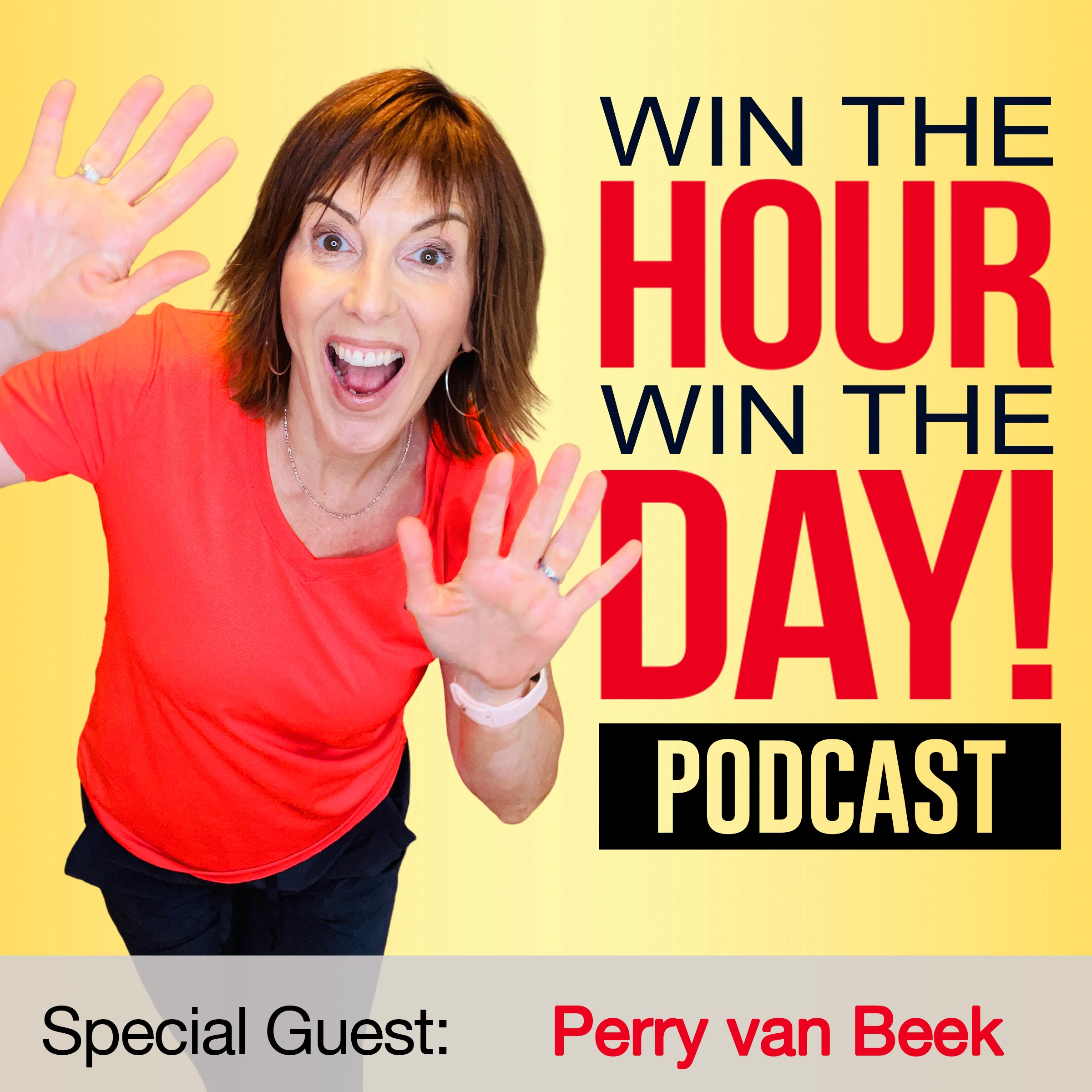Episode Summary This week’s episode of Win The Hour, Win The Day Podcast interviews,...

Are You Ready For Your Next Big Win?
Know your entrepreneur personality and I’ll take it from there!
Recent Podcast Episodes
Slow Down to Speed Up: Repurpose Video Content with Jeff Sieh
Episode Summary This week’s episode of Win The Hour, Win The Day Podcast interviews,...
Virtual Assistant Hiring Secrets: Leadership that Drives Success! with Wally Malaque
Episode Summary This week’s episode of Win The Hour, Win The Day Podcast interviews,...
Boost Your SEO: Leveraging Pinterest as a Powerful Search Engine! with Meagan Williamson
Episode Summary This week’s episode of Win The Hour, Win The Day Podcast interviews,...
Transform LinkedIn Posts into Binge-Worthy Stories with David Young!
Episode Summary This week’s episode of Win The Hour, Win The Day Podcast interviews,...
Leading Virtual Teams: Angelene Balansag on Empowering Workspaces
Episode Summary This week’s episode of Win The Hour, Win The Day Podcast interviews,...
Unlock Virtual Event Success: Michael Tucker’s Expert Strategies
Episode Summary This week’s episode of Win The Hour, Win The Day Podcast interviews,...
Power Your Podcast: Key Guesting and Marketing Tips! with Kamie Lehmann
Episode Summary This week’s episode of Win The Hour, Win The Day Podcast interviews,...
Unlock LinkedIn Success: Harness Sales Navigator Today! with Perry van Beek
Episode Summary This week’s episode of Win The Hour, Win The Day Podcast interviews,...
Boost Your LinkedIn Impact with Video Communication Tips! with Troy Hipolito
Episode Summary This week’s episode of Win The Hour, Win The Day Podcast interviews,...
Master Communication and Power Persuasion Skills with David Tyler
Episode Summary This week’s episode of Win The Hour, Win The Day Podcast interviews,...
The Power of Storytelling: Master Video Branding with Elin Giczi
Episode Summary This week’s episode of Win The Hour, Win The Day Podcast is...
Selling Sincerely: Blake Binns on Real Connections in Sales
Episode Summary This week’s episode of Win The Hour, Win The Day Podcast is...
Preventing Burnout with Smart Work Tools! with Kris Ward
Episode Summary This week’s episode of Win The Hour, Win The Day Podcast is...
Master Social Selling: Heidi Medina’s Strategies for Engagement
Episode Summary This week’s episode of Win The Hour, Win The Day Podcast is...
Boost Productivity and Master Storytelling! with AmondaRose Igoe
Episode Summary This week’s episode of Win The Hour, Win The Day Podcast is...
Master Video Marketing: Top Tips for Entrepreneurs with Dan Bennett
Episode Summary This week’s episode of Win The Hour, Win The Day Podcast is...
Boost Your LinkedIn Strategy with AI Tools for Enhanced Productivity! with Joe Apfelbaum
Episode Summary This week’s episode of Win The Hour, Win The Day Podcast is...
Mastering Personal Branding with NLP Techniques! with Olesija Saue
Episode Summary This week’s episode of Win The Hour, Win The Day Podcast is...
Innovative Lead Generation and Email Automation Secrets with Jennie Wright
Episode Summary This week’s episode of Win The Hour, Win The Day Podcast is...
PR Strategies for Diverse Entrepreneurial Impact! with Jennifer Singh
Episode Summary This week’s episode of Win The Hour, Win The Day Podcast is...
Convert More Clients on LinkedIn with Richard Moore
Episode Summary This week’s episode of Win The Hour, Win The Day Podcast is...
Master Business Growth on Pinterest with Meagan Williamson
Episode Summary This week’s episode of Win The Hour, Win The Day Podcast is...
24/7 Sales Boost: Video Marketing Secrets with Alex Sheridan
Episode Summary This week’s episode of Win The Hour, Win The Day Podcast is...
Master Public Speaking Tips with Nausheen Chen!
Episode Summary This week’s episode of Win The Hour, Win The Day Podcast is...
How To Write The Right Stuff For Your Business! with Shaun Bernstein
Episode Summary
Shaun Bernstein brings the right stuff! Listen in as he gives a new perspective on writing for your business. It’s easier than you think. And more necessary than you understand!
Learn
-how to get out of your head and into your story
-the missed opportunities in storytelling and how to fix them.
-the simplest but most effective hook to grab attention
And MUCH More!
You can find Shaun Bernstein at:
Website: www.thewritestuff.agency
Email: shaun@thewritestuff.agency
LinkedIn: https://www.linkedin.com/company/the-write-stuff-agency/
Instagram: @thewritestuffagency
Facebook: https://www.facebook.com/thewritestuffagency
Win The Hour Win The Day
https://winthehourwintheday.com
Shaun Bernstein Podcast Transcription
[00:08:11]Kris Ward: Hey, everyone. Welcome to another episode of Win The Hour, Win The Day. And I am your host, Kris Ward. And today we have in the house, Shaun Bernstein. Okay. Shaun is from the write stuff. That’s W R I T E like you’re writing the right stuff. And he’s going to talk to us about Content Writing. He’s a content writing agency.
[00:08:32] The guy tell you, Shaun, for some of us, that sounds a little painful. So why don’t you jump right in, Shaun and tell me why I’m wrong and what we can do to make this more dynamic and interesting and get better results?
[00:08:43]Shaun Bernstein: Hey Kris, I don’t know that you’re actually wrong. It is painful for a lot of folks. So I’m here to really help ease that pain. I’m like the pain medicine when it comes to writing.
Writing is hard for professionals, especially for two really distinct reasons that I’ve come across. Number one is they’re just not great at it. They’re really good talkers and they can talk to you all day and they can sell anything to anyone.
[00:09:06] And they’re just exceptional when you see them face to face, but put him in front of a keyboard and they just freeze up. They just don’t have the words there. Or you get into that lucky position where you’re just too busy to write. Writing is you have to put content out there, you know it’s important for your business, but you’ve got everything on fire on your desk and you were just scrambling to deal with what’s right on your plate right away.
[00:09:28] And so, that blog posts meaning to get to it gets pushed back and pushed back and pushed back and pushed back. And it just never comes together. So, marketing unfortunately takes that back burner when you think that everything else is on fire. So I really come in to help on both of those camps.
[00:09:45]Kris Ward: All right. Well, you’re taunting me a little bit, cause I’m having difficulty breathing when you talk about your desk on fire. Cause we’re very anti that in my world, but I totally appreciate what you’re saying is it does take some time. And I know for me, I’m very purposeful about my content writing, but also then you can’t just write it.
[00:10:02] You got to come back and have fresh eyes and reread it and there’s all that process and some keywords and stuff. So yeah. So, neglected whether purposefully or indirectly, whatever. So we’re going to, when we do it, what is it that we need to be doing to make this content a little bit more purposeful so that, when we do buckle down and do it, it’s got a longer shelf life or a bigger reach.
[00:10:30]Shaun Bernstein: So it’s really a first step and putting yourself into the shoes of your readers. And what do your readers actually want to see? And you can talk about the nitty-gritty and the ins and outs of your business and your thought leaders really sort of deep level thought leadership philosophy. And that’s great.
[00:10:45] But if it’s not going to make sense to the people who are actually coming to pay you money, that it’s not really going to do a whole lot for you. So really put yourself into the shoes of those who we’re going to be reading your work and start from there. What do they want to see? What do they need to know about your business?
[00:10:59] What do they need to know about your industry? What is it that is new and hot or a new trend that they’re probably wondering about, they’ve heard about what can you offer them as a little bit of information, a little bit of guidance? Start with those kinds of things and really take it a step back. Yeah. You’re going to get some quick content out of that to start with.
[00:11:16]Kris Ward: Okay. So what you’re saying then also I’ve heard it before. It all sounds like it’s making sense, but I think you’re… just today and this is something we all do. And I say this very confidently to other people. But of course you always think you’re excluded from this, but I would argue, I would say 80% of websites are written for other individuals in your field.
[00:11:38] Like they’re talking above, like you could be something as simple as I remember being younger and looking for insurance and you land on the page for what my car. And it’s like, why pick the best insurance broker? Well, I didn’t even know what a broker was I’m like, oh, what’s a broker?
[00:11:53] Right? Okay. So that’s not written to me. And just today I was doing a little post on LinkedIn and in the past, I’ve always sort of written about; you don’t have to work this hard and why systems and processes is so important that we talk to you better Super Tool Kit, and there’s still room for all that.
[00:12:12] But a real direct conversation. So today I was writing a post. I had a picture of one of my clients who is meeting for the first time. Cause we hire, train and onboard when we have clients working for us and in order to have systems and processes, you need somebody to implement them.
[00:12:28] So we help you build your team. So I had a picture of us up there during the interview and I wrote, “Hey, she’s really excited. And this is how the interview went and blah, blah, blah” And I had never really done that before. Cause I’m all like the bigger picture and I’m all about like writing the manual and it was… I saw a real difference.
[00:12:45] I just put it up, but I saw a real difference in the tone of it. And I guess I try really hard in my videos not to do this, but I think in the writing, I’m still presenting instead of talking.
[00:12:57]Shaun Bernstein: That there’s so much of that. And the insurance was a really good example. I personally come from the legal world.
[00:13:03] I was a lawyer before I was doing this. Don’t hold it against me. But lawyers and those kinds of professionals are some of the worst culprits, because if you sort of run in that sphere and you are hanging out with other people in your social life, you’re running that sphere. It’s really easy to forget that your clients don’t and they don’t always know and understand what you’re talking about.
[00:13:22] You know, I used to have clients that came knocking on my door and I was writing when I was practicing law, but you have clients that come knock on your door and they say, well, this has happened to me. And I believe it’s this. Same with probably people who go to doctors and they have been diagnosing online and they look things up and they think they know everything because they’ve used in a couple of things online and they don’t really understand what something means.
[00:13:42] Happens a lot. Law happens with insurance brokers, happens with a lot of professionals and we get into that presenting mode versus talking. She can present on something and give some high-level information on a certain issue, but are you really talking to that audience? So you really making sure that they understand and that they’re actually connecting with what you’re trying to say.
[00:14:04] And it is a different level of discourse. And I think it gets a little lost amongst professionals that they’re worried, oh, you know, that’s gonna be too simple or that’s just too far of a step down. And it’s really not. It really is not. I’ll go on for 10 more seconds because one of the things I talked to my clients about is being the shy kid in class.
[00:14:24] We’ve all been the shy kid in class at one point. And it happens to us in a professional…
[00:14:31]Kris Ward: I didn’t have that problem, but go ahead.
[00:14:33]Shaun Bernstein: You were the shy kid, but a lot of us were even today. If you’re in a professional seminar and someone’s at the front of the room, they’re talking about some that you don’t understand, they might ask if there’s any question. But you’re going to be the lone person raising your hand,
[00:14:46]Kris Ward: You might be the less confident one.
I may not have been shy, but I’ve been less confident, so, okay. So you’re talking about that. Yeah, go ahead.
[00:14:53]Shaun Bernstein: No, so that’s exactly it. So, we don’t want to admit, we would understand something and especially as we get older and as we we may have confidence, but we’re shy and hesitant to admit if something’s not a hundred percent clear.
[00:15:04] As a content writer, who’s really writing for a broader audience. Don’t hesitate to make something a hundred percent clear, really spell it out, give some imagery, give something that someone can really kind of bite onto and make sure that someone understands what it is you are talking about. So if you know, they’re looking for an insurance broker, as you mentioned, why do they need a broker?
[00:15:25] What is a broker? What does a broker do? How can a broker help, set yourself apart by really offering that extra level of breaking things down and your clients will thank you for it.
[00:15:37]Kris Ward: I think, as you’re talking, I just made a note to myself, like, ah, probably you just write posts or blogs or whatever on frequently asked questions, FAQs, cause then we would bring ourselves down to like, yeah, that’s a great question.
[00:15:49] I get that a fair bit where we tend to talk above. So it is opening my mind just as we talk about big opportunities that I know I’m missing. You also, Shaun, we talked a fair bit too about when we chatted before, you’re a big proponent of stories. And that they really drive the point home. And I know we hear this all the time, but I think it gets forgotten or what makes a good story or how long should the story be or how often do we tell a story? Like I don’t know, give us some inspiration or insight onto that.
[00:16:26]Shaun Bernstein: I think the stories are so important because they’re really how we connect with each other and yeah. This is new media and digital media and all of that. But storytelling is one of the world’s oldest pastimes, and we’ve been doing it since we invented fire and we’re sitting around a fire talking to each other.
[00:16:41] It just goes back before anything. So, it’s so ingrained within us. And I think they really resonate people. Remember stories. If you want to be memorable in your business. Don’t hesitate to tell a story. People see themselves in stories, they can picture something, it kind of leaves that sort of mental picture, as they say, oh, I know someone who’s exactly like so-and-so or I’ve been in the situation myself or okay this makes sense to me because I can see it. It’s not just words on a page. It’s really engaging those words. Cause you instantly have that picture of what’s going on there.
[00:17:08]Kris Ward: So what makes a good story?
[00:17:22]Shaun Bernstein: What makes a good story. Well, you want to have, I mean, it sounds cliche, but you want to have a point.
You want to have a reason why you’re telling the story. You’re not just sharing stories. No one wants to listen to someone at a dinner party.
[00:17:33]Kris Ward: Okay do you need to tell somebody that Shaun? Although I have talked to people I’ve listened to other podcasts, for sure. I’m a podcast junkie. Sometimes they think, oh my gosh, that person’s got to land that plane.
[00:17:43] Right. But do you need to tell somebody, I, maybe this is where again, I’m starting above the thing, but are we starting with, what is the point of this story? Like do you have to tell people that?
[00:17:57]Shaun Bernstein: I think you do. I think you want to have an inroad, you want to sort of be able to set something up.
[00:18:01] You want to be able to set something up that’s going to be relatable to someone. So for example, let’s use it back in that business context. When I am working with a professional who’s in the service industry. I want them telling stories about how they can help a client. And so usually that story’s about how they’ve helped someone previously.
[00:18:20] I talk about one of the best newsletters that I’ve seen, open with the subject line. This couple made a huge mistake and here is how I helped them. It really wasn’t work. And then it went into the story of okay. He was what these people did and here’s how this person was able to help.
[00:18:39] So it doesn’t have to be more complicated than that, but it does need to have a point which is key, and it does need to sort of have something relatable. You shouldn’t have a story of, ‘I can talk about that time that I had, I’ll make something up that I was tracking through the Andes or that I climbed Kilimanjaro.’
[00:18:56] And you know, those are great. And if I have a point, then I’m getting somewhere. But that’s something that a lot of people don’t connect with. You have to know if you’re telling a story like that, that you’re not gonna have that sense of familiarity. But if you’re talking about struggle, you’re talking about challenges talking about a big undertaking.
You can talk in those sorts of terms that someone can really say, oh yeah, that reminds me of that time that I did this.
[00:19:20]Kris Ward: Okay. That’s a good point. Yeah. Yeah. That makes a good point. And I think too, also something you’re mentioning and I believe firmly in this, but I don’t think everybody understands this is the stories don’t need to be hugely deep or profound, or you don’t need to be climbing that mountain.
[00:19:35] Like there are just fables and stories and, you know, and we know. Like anything we read, we always, I know I do. I like, oh yeah, I read something like, oh, that makes it sense. And you realize you’re not doing it right. But the most simplest, profound stories you read in other people’s books or posts or whatever, really have a big impact on you.
[00:19:52] So it doesn’t have to be some big life. We all don’t have to be a hero or look, I’m in a, whatever. I’ve got this limitation and I climbed four mountains and you can do this too. It doesn’t have to be like that.
[00:20:06]Shaun Bernstein: Exactly exactly. You know, and there’s a place for those stories and that’s great. And yeah, if someone climbed every mountain in the world, maybe you want to go out and buy their book.
[00:20:15] Cause that’s wonderful. But in a business, in a professional context, you know, those things are only going to get you so far. You want those stories that are really going to be relatable to a whole lot of readers that are actually picking it up and stories that are going to know when to talk about having a point, talk about how you as a professional can help someone.
[00:20:33] That to me is everything. So you have to find a way to work it back to that sort of coronary native of, “Okay. Here’s what to take from this. And here’s how I can help.”
[00:20:44]Kris Ward: So what are some mistakes that people make when leaning in and using stories as a lesson tool?
[00:20:52]Shaun Bernstein: I find that they don’t, we talked about sort of having a point seems so obvious, but you find some litigious don’t.
[00:21:00] If you find examples of things that are sort of rambling on or they’re so esoteric, they’re so far into the weeds about something that they sort of lost the plot and they’re sidetracking. They try to tell too much, they’re getting into way too much detail. That story that doesn’t go anywhere.
[00:21:19]Kris Ward: We would have loved my grandfather. Dear Lord, it wasn’t as he was older, he was like that his entire life. What the heck are we talking about? I lost track. Okay. All right. So here’s a quick example. Well, we work with our clients. We help them. We hire, we find a team for them. We go out and recruit and we go through this whole 12 step process.
[00:21:41] And then we present them to the client and we sort of help the client. We need to teach them how to train them. Right. It’s like, there’s a way. And one of the big things we talk about is culture and giving them sort of risk opportunities versus obedience. We don’t want obedience. We want opportunities for them to show us what they are.
[00:21:57] And people will say to me, like just yesterday, we were working with a client. Got her, her first hire so that she can start doing all this stuff. Super Tool Kits and everything. And when she’s oh yeah. I always tell people, I work with and ask lots of questions and Loma, and I was giving her examples of how you have to show, because you tell people you want them to have ideas.
[00:22:14] Everyone says that until maybe you feel like, oh yeah, I had this great idea, but me and my boss, I did not sound so great. Now they’re mad at me. Right. So I gave her this quick story. I said, look what you say, you have to show them that you mean it. And I said, it’s kind of like, My husband, for whatever reason, I don’t know if he thought the world was at all cruel to me in any capacity, because he felt like did a lot for a lot of people, he would like, that’s it.
[00:22:36] Like he always came home with an ice cream. Like he went to the store and got me these particular ice creams. And of course he would hand it to me, eight o’clock at night and I’d look at him and like, it’s very sweet and thoughtful. So I would smile. This was his gesture, like, oh, he felt, you know, I deserved a treat and I’d say to him, I don’t need an ice cream at eight o’clock at night and it’s not helpful and it’s not good to me, but thank you so sweet.
[00:22:58] Thank you so much. Of course, I ate the ice cream, right? So what I was saying and what I was doing were two different things. And I gave that example to Christine yesterday saying, “Look…” Because you say this until they see it backed up, you have to really reinforce it in the beginning and she’ll give opportunities that you can show them what you say and what you mean or the same thing.
[00:23:19] So would that be an example of an effective tool? Was it too short? Was there not enough hero in the story?
[00:23:26]Shaun Bernstein: No, I think, instantly, look at what you just did.. is you just opened up right away. We’re talking about clients and client experience and professional experiences, but you’ve instantly shared a story about your husband.
[00:23:37] You’ve spoken about him before and you shared a story about your personal life and it wasn’t anything too revealing and it wasn’t anything earth shattering, but it didn’t slam thinking about, okay, what are times that someone did something that is nice for me? And what does that sort of personal information that someone likes, when they do something good for someone else and what are times that people have treated me with kindness?
[00:23:58] So I’m hearing your story. I’m seeing you open up a little bit as a professional, instantly professional… a persona and I’m thinking about myself and going, okay. I can really connect with that and resonate with that. That to me is what stories do, I think he just did it perfectly.
[00:24:14]Kris Ward: Okay. Okay. Well, there we go. Here’s my show. He’s going to have to say some nice things to me, right? Okay. All right. So, all right. So they do have a point. Give us some other things that we can work on in using stories as a tool for our business.
[00:24:28]Shaun Bernstein: I think giving them a little bit of personality. And giving yourself a little personality, like we just talked about you just doing that and exposing yourself a little bit.
[00:24:38] I work, like I said, come from legal and I actually was on bay street in Toronto, which could be very buttoned down and very.. three piece suit at one point. But it’s less and less like that as time goes on. And especially, with professionals that are running their own businesses and working hands-on I think that image of that we all have to be pictured in a top button done up in a tie all the time.
[00:25:00] We can let our hair down a little bit. It’s 2022 and digital marketing is taking over and people are making fortunes on TikTok from doing silly dances. We’re exposing… not that you have to do that as an insurance broker or accountant. But people are exposing themselves a little bit and really become a little bit more vulnerable in telling stories about themselves as well as others.
[00:25:21] And I think there’s a lot to that. You have so many stories of your own and you’re probably… as a professional, maybe a little shy about opening up or whether it’s getting too personal with clients, are you exposing yourself a little bit? But I think as times are changing as we’re becoming sort of more open with each other, there’s so much more room for that. So if you really lost that sort of that story to tell, look within and see, how you can find something within your experience that your clients can relate to.
[00:25:52]Kris Ward: Yeah, I will say the word shy. I don’t know if that’s sort of use, but I have, it has been an effort and a something that has resurfaced many times.
[00:26:02] My team brings it to me where I don’t share as much as I should on social media. And you tend to lean into again, the purposefulness of your service versus ‘Hey. I’m doing this, right?’ Like just sharing who you are. Cause I agree with you. It really is a less polished you are. I mean, I don’t mean don’t show up, not professional, but this idea of… even for me, I was wearing business jackets for years going, well, I don’t feel comfortable with this.
[00:26:29] I can’t wait to get it off, shoulders back looking like a professional and I can dress quite appropriately with my own style instead of putting on the business uniform. So I think. It’s just making that making, I guess the lesson I’m hearing from you is make yourself a little bit more three-dimensional and that the shouldn’t be like that maybe there once upon a time, was this big division between who you are professionally and who you are personally, there should be some ebb and flow that you can share too much.
[00:26:57] I’ve seen those too, but a lot of us are not… I know for me, that’s not a problem I’ve ever had. So, make sure you weave your personality into your messaging.
[00:27:08]Shaun Bernstein: What I’m seeing a lot of, that’s been really interesting through the past couple of months, especially as we’re entering this new world, our head changing.
I did it myself and I did it. I’d had a couple professional headshots during my legal days, and they’re all me in that suit and tie and yeah, I’m smiling because I smile all the time. But I’m in that suit and tie and I’m looking very buttoned up. And when I started my business, I said, okay, I need to rebrand.
[00:27:32] And I need new headshots that looked like me. Because the ‘me’, and especially the meaning in this world is not someone that’s in a suit and tie. I’m usually in a sweater or a flannel shirt, and I’m at my home keyboard and I’m doing my thing. I’m going to be on calls with clients, but not expecting you to tie.
[00:27:45] I’ve actually even seen lawyers start to change them. If someone posted that, after five years, they wanted a headshot that actually reflected themselves and their sweater and a color with their sleeves rolled up and their tattoos showing. And that doesn’t make him any less.
[00:28:00]Kris Ward: Yeah, but that’s like, oh my gosh, he came from prison now. No, no tattoos, no like artistic, if you’ve got tattoos. Yeah, yeah. Yeah.
[00:28:10]Shaun Bernstein: So people are, especially in it. It’s not even just, you’d say, okay, it’s a younger generation, but it’s not even a generational thing. I think on the whole, we’re really opening up or becoming a little bit more vulnerable, a little bit more open.
[00:28:21] And I think it makes us a better professional, no matter what we’re doing. If we’re serving the clients, we’re better more empathic. We understand people better. We’re really able to connect. We’re showing that, okay. We have a bit of a story that we’re showing, whether it’s through words or through showing some tattoos or a bit of our hair, there’s always a story there. And we’re able to connect with the stories of others, where we’re sort of showing that we’re receptive and open.
[00:28:48]Kris Ward: I know when we chatted, we were talking about… as you said, please forgive me. I used to be.. illegal. And I know for you, I’m like, how did you get from there to here? And you talked about like, even when you’re going through a file, the stories in there.
We changed everything for you, and took it from this dry legal thing to a story. And I think for me too, that was a very powerful story. You shared stories?
[00:29:13]Shaun Bernstein: No, I always saw my clients. I’m you’re looking right now and the audience can’t see, but I’ve got my bookshelf behind me.
[00:29:20] That’s mostly biographies. I’ve loved stories and seeing how I could first read, it’s just a thing about me. And so when I was working with clients, head on, they’re coming to see me at one of their hardest points. I ended employment. I had a lot of people who had come to see me either the day, ideally not, but the day they’d been let go or the day after, and you know, their whole world is crushed.
[00:29:39] I might’ve been at that job 20, 30 years and suddenly, you know, the rugs been pulled out from under them. And so, you know, yeah, I could sit there and play with a mathematical formula and say, okay, you’ve worked here this long and you’re this old and your case is probably worth X, but there’s so much more to the math.
[00:29:54] There was a human there. And there’s a story there. There’s a story of, what’s going to happen to this person, how are they going to get through the next days? What are they going to do about, their family and their kids and their own health and what was the story of their time with the employer and what happened?
[00:30:09] How are they feeling and what are they going to do next and what opens up. And I’m telling, they’re hiring me really as an advocate to tell their story. Number one, you know? So whether I’m writing a letter to their former employer or whether I’m drafting a claim for court, I’m really spelling out their story.
[00:30:26] That’s, you know, part of what I’m doing. And I’m really getting to know my client and really embrace their story. When you, if you know, for lawyers, I talked to them quite a bit. If you’ve ever read a legal case. Yeah. You can look at sort of okay. How it changes the law and what the judge said about this principle in that, but there’s always a story there.
[00:30:43] There’s always a story of parties who are in disputre. And they believed in what they were fighting for long enough that they got to a judge or a trial process, which is not easy to do anywhere you are, you know, cause there’s a lot of steps in place to settle that down. There is a real passion there and there’s a story there, whether it’s a great story.
[00:31:02] Sometimes it’s a sad story. Sometimes, you know, it’s not, not good news, but there’s always something there and the better that you and that’s not true, you and far beyond just law. So the sooner that you recognize your client’s stories and really are able to engage with them and realize that, you know, that they realize that they are more than just a bill or a set of numbers to you, that they’re a person with a story. I think that makes you a better professional.
[00:31:28]Kris Ward: I think too, I’ve always been a sucker for bios, biographies, because what I find is really interesting, like things that I’m like, I have no interest in this person. And then all of a sudden you hear these behind the scenes stuff that go, wow, I didn’t know that. Or like, there’s, I think it’s always fascinating.
[00:31:42] There’s such a story behind the story. And I think what’s changing in my mindset right now, as I speak to you, I realize that. Back to where I said, I think I present instead of talk, I realize how many stories I could be telling you about my clients and I present what we do and why we do it and how important I think it is and how much I am passionate about helping you, your business should support your life instead of consuming it.
[00:32:06] But I could be doing one day a week, whatever. Here’s a story about Sarah. Here’s a story about Christine here, where she came in like, oh my gosh, like how long I’ve not been doing that. So I think. I tell stories to drive home a point when I’m working with clients, but I think I’m not pulling back the curtain and telling stories. That is part of just the fabric of my communication instead of presenting.
[00:32:23]Shaun Bernstein: And make it a habit. And I think Kris, what you’ll find is you’ll reach a broader audience because you’re going to have people that are receptive to what you’re doing and that’s great and it’s working and you know, you’re running a great business, but you’re gonna reach a whole other subset of people.
[00:32:40] It’d be more interesting. I don’t have time to talk to you any more, Shaun, I got to go write some stories I got to get on. Why did I not do this sooner? Because whatever. And I will tell people, you know, if I was talking to you, I would be like, oh yeah, this is really exciting. I had this client this week that this happened and I tell those stories, but never in a blog or a post.
[00:33:00] Is that, because I think that thing from school where you, again, you sit down and go character, write an essay, right. Even though I always talk about, you know, hit that thing on Google, there’s a little thing where you can just transcribe. So I talk and then I edit my writing because it comes out much more fluid and it’s faster.
[00:33:17] And you talk faster than you type, no matter how much, how fast you type, blah, blah, blah, but still, I still think you’re thinking with a different part of your presentation brain when you’re trying to communicate like that. Oh, my gosh. Okay. Where did the time go, Shaun? Excellent. All right. That I’ve had a lot of aha moments here. Shaun, where can people find more of your brilliance?
[00:33:36]Shaun Bernstein: So you can find me online at.. my website is www.thewritestuff.agency. It’s the write stuff agency. So not even the.com. It’s the write stuff.agency. I’m on Instagram @thewritestuffagency. I’m on Facebook at The Write Stuff Agency. My wife has me on TikTok now. I’m not doing much dancing, thankfully.
[00:33:59] But I’m basically anywhere you can find me at the Write Stuff Agency. And I would love to connect and hear more about your story and see if I can help.
END[00:34:08]Kris Ward: Fabulous. Okay. That was spectacular. Thank you so much, everyone else. We will see you in the next episode. Thanks.





























